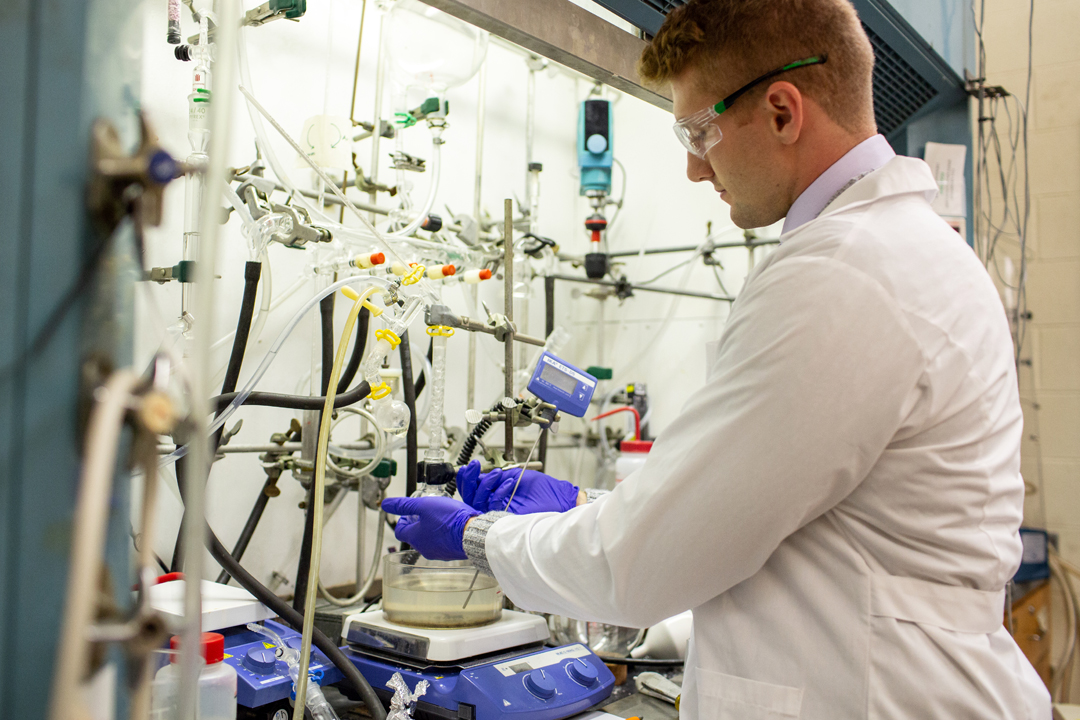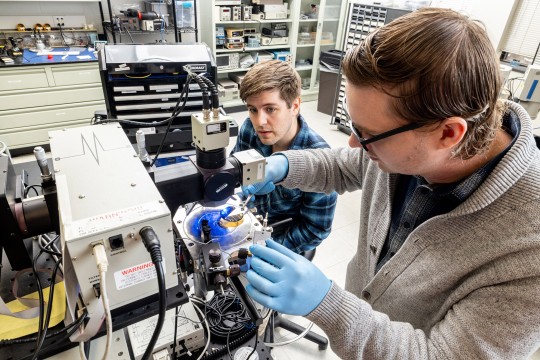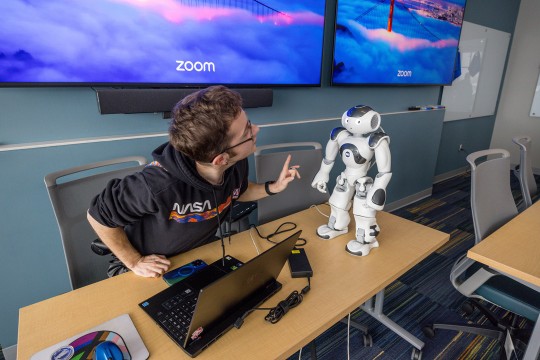Student to Student: Sustainable polymers
Research overview by Liam Reilly
Jaime Huynh, RIT Student
Liam Reilly is a 4th year RIT Chemistry student and his mentor/advisor is Dr. Matt Miri, associate professor at the School of Chemistry and Materials Science
When we talk about sustainability, we are really talking about the ability of our species to exist and commit to non-self-extinguishing practices. It often comes up today in the context of our currently unsustainable energy production, but the idea of living sustainably is relevant in any relationship humans have with our environment. My research is centered on one specific relationship we have with nature, our production and disposal of our most commonly produced material: Plastic.
The plastics we use today have two major problems: The first is that they are sourced, almost exclusively from fossil fuels and crude carbon deposits. In addition to the fundamental flaws in relying on an unsustainable finite resource, the collection and processing of this raw material is also quite damaging. The second major issue with our modern plastics is that we aren’t very good at disposing of them. Only about 9% of plastics ever made have been recycled, with the majority ending up in landfills and a marginal amount being incinerated. There are serious problems and challenges with each of these official disposal methods, even recycling. However, the more substantial issues come from all the waste which doesn’t make its way into proper waste streams. Most of the mismanaged plastic waste instead ends up in our oceans, where it has devastating effects on our marine flora and fauna. The last I read, something on the order of 8 million metric tons of plastic enters our oceans every single year. That’s close to 22,000 tons per day, which is almost unfathomable. Even worse, that number is only expected to increase as our production of plastic products (especially single-use items) continues to skyrocket. Clearly something has to be done, and while chemists cannot solve this problem single handedly, they will undoubtedly be a huge part of any serious solution.
I’ve been involved in research here at RIT since the Fall of my freshman year. During that time my primary focus has been on the development of novel sustainable polymers of functional interest. In short, I work with my research advisor, Dr. Matt Miri, to try to create new environmentally friendly plastics with interesting properties. My current project is centered on an interesting molecule: eugenol, which is extracted from the clove plant. I am working to develop interesting synthetic routes for the production of eugenol based polymers which would be derived from a renewable resource and have potential for degradation in aquatic or enzymatic environments.
The trick with my research comes in trying to mimic or improve on the physical properties of the petrol-based plastics we use today, and to do so while maintaining economic viability. I’ll let you know, that’s much easier said than done, but we have to start somewhere. I imagine that someday humans could rely on fully renewable bio-sourced plastics with highly controlled degradability for the majority of our material use cases. That day might be several generations away, but it is important that we now start to lay the groundwork for that reality.
How did you come to study sustainable polymers at RIT?
During my freshman year chemistry seminar class, which all incoming chemistry and biochemistry students take, we were discussing different opportunities available to students here at RIT. I was already interested in participating in research at some point in my undergraduate career, so when Dr. Paul Craig talked to us about joining research groups as early as our first year I was very interested. I went up to him after that session and asked if there was anyone here doing research on new plastics or environmentally friendly materials and he referred me to Dr. Miri.
I followed up with Dr. Miri via email and arranged to meet with him to learn more about what he was working on. We really hit it off, and I was fascinated by his research so I asked to become involved, and the rest is history!
What motivated you to participate in research on sustainable polymers?
I was motivated to participate in research on sustainable polymers when I learned of the vast and completely unnecessary damaging effects that our plastic production and waste has on our environment. From its sourcing and processing to its use and disposal, our plastic problem is a complicated issue. Many different things need to change scientifically and politically to fully eliminate our wasteful and irresponsible use of our natural resources. I saw the chance to combine my interest in the chemical sciences and my passion for the preservation of our planet in this research and jumped at the opportunity to do so.
What was the most unique experience you had related to your research?
I guess the most unique experience I’ve had related my research was this past summer. I flew out to San Diego, California, to present my research for the first time externally at the American Chemical Society’s national meeting. It was an amazing experience to discuss my work with other students and even some experts in the field. I was able to meet some really interesting people and quite a few big names. If RIT didn’t support their undergraduate researchers to the extent that they do, there is no way I would have been able to do that.
Sources:
Only 9% of plastic recycled: https://www.nationalgeographic.com/news/2017/07/plastic-produced-recycling-waste-ocean-trash-debris-environment/
https://www.statslife.org.uk/news/4026-statistics-of-the-year-2018-winners-announced








